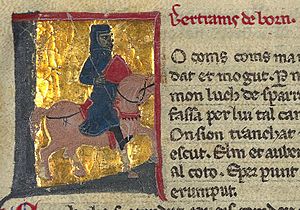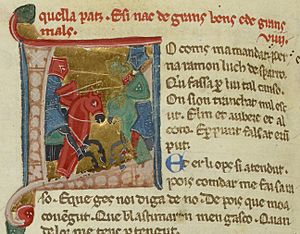Bertran de Born facts for kids
Bertran de Born (Occitan: [beɾˈtɾan de ˈbɔɾn]; born in the 1140s – died by 1215) was a powerful baron from a region in France called the Limousin. He was also one of the most important Occitan troubadours of his time. Troubadours were poets and musicians who wrote and performed songs, often about love or politics.
Bertran wrote love songs, but he was especially famous for his political songs. He often got involved in the big arguments and wars between powerful rulers like Richard I and Phillip II. Bertran was married twice and had five children. Towards the end of his life, he became a monk.
Contents
Who Was Bertran de Born?
Bertran de Born was the oldest son of Bertran de Born, who was the lord of a castle called Hautefort (in Occitan, Autafòrt). His mother was Ermengardis. He had two younger brothers, Constantine and Itier. When his father passed away in 1178, Bertran became the new lord of Hautefort. By this time, he was already married to his first wife, Raimonda, and they had two sons.
Hautefort Castle was located right on the border between the Limousin and another region called Périgord. This meant Bertran often got pulled into the fights between the sons of King Henry II of England. He also had his own battles to keep control of Hautefort.
In those days, it was common for brothers to share control of a castle or land. This was called a "co-seigneurie." Bertran had to share Hautefort with his brothers, and he often fought with his brother Constantine over it. These family struggles and political issues were a big part of his poems.
Bertran's Career as a Troubadour
Bertran's earliest known poem is from 1181. It was a sirventes, which is a type of political or satirical song. Even then, he was already known as a talented poet.
In 1182, he visited the court of Henry II of England, his overlord. That same year, he joined a rebellion led by Henry's son, Henry the Young King. This rebellion was against the Young King's younger brother, Richard, who was the Count of Poitou and Duke of Aquitaine. Bertran wrote songs to encourage other nobles, like Aimar V of Limoges, to join the rebellion. He even took an oath against Richard in Limoges. His own brother, Constantine, sided with Richard, so Bertran forced him out of Hautefort Castle.
Sadly, Henry the Young King, whom Bertran had often praised in his poems, died during a military campaign in June 1183. Bertran wrote a sad poem called a planh (a lament or mourning song) in his memory.
After the rebellion, Richard, with help from Alfonso II of Aragon, attacked Hautefort and gave it to Bertran's brother, Constantine. However, King Henry II was reportedly touched by Bertran's sad poem for his son. So, he gave the castle back to Bertran. Constantine then became a soldier for hire.
Bertran later made peace with Richard and even supported him against Philip II of France. Bertran was very clever at using the disagreements among the powerful Plantagenet family (the English royal family) to keep his own independence. He even gave them nicknames in his poems: Henry the Young King was "Mariniers" (Sailor), Geoffrey of Brittany was "Rassa," and Richard was "Oc-e-Non" (Yes-and-No).
While he wrote a few love songs, Bertran de Born was truly a master of the sirventes, his political songs. He often wrote about the excitement of warfare.
When Richard (who was now King of England) and Philip delayed going on the Third Crusade, Bertran criticized them in songs. He praised the brave defense of Tyre by Conrad of Montferrat. When Richard was finally freed after being held captive, Bertran welcomed him back with another song. It's interesting to note that one of Bertran's sources of income came from the market in Châlus, which is where King Richard was later fatally wounded in 1199.
Later Life and Becoming a Monk
Around 1196, Bertran's second wife passed away. After this, he decided to become a monk. He joined the Cistercian abbey of Dalon in the Dordogne region. He had given many gifts to this abbey over the years. His last known song was written in 1198. We don't see his name in official records after 1202, and he was definitely gone by 1215, as there's a record of a payment for a candle for his tomb.
Bertran's Works and Family
Bertran de Born wrote about 47 poems. We know for sure that 36 of them were his, and 11 others might have been. Some of the tunes for his songs still exist today, and several music groups have recorded them.
Bertran de Born was married twice. With his first wife, Raimonda, he had two sons and a daughter:
- Bertran, who also became a troubadour.
- Itier
- Aimelina, who married Seguin de Lastours.
With his second wife, Philippa, he had two more sons:
- Constantine, who became a monk at Dalon Abbey with his father.
- Bertran the Younger
Bertran in Stories and Poems
Later stories about Bertran de Born, called vidas (which were like short, romantic biographies), claimed that King Henry II believed Bertran had encouraged his son, Henry the Young King, to rebel. This idea influenced later writers.
The famous Italian poet Dante Alighieri wrote about Bertran in his epic poem, the Divine Comedy. Dante's description of Bertran then influenced other literary works. For example, in her poem Cœur de Lion (1822), Eleanor Anne Porden shows Bertran causing trouble during the Third Crusade. Because he felt bad about his role in Richard's imprisonment, he becomes a hermit. He also appears as a small character in Maurice Hewlett's novel The Life and Death of Richard Yea-and-Nay (1900), where he is not shown in a very good light.
However, the American poet Ezra Pound had a more positive view of Bertran. Pound translated some of Bertran's songs and wrote his own poems inspired by him, like Na Audiart (1908) and Sestina: Altaforte (1909).
Bertran was also the subject of a 1936 play called Bertran de Born by Jean Valmy-Baisse. The composer Darius Milhaud wrote music for this play, which he later turned into his Suite provençale.
More recently, Paul Auster mentions Bertran de Born in his novel Invisible (2009). In the story, the main character meets a Frenchman named Born and helps correct a translation of one of Bertran's war poems.
See also
 In Spanish: Bertran de Born para niños
In Spanish: Bertran de Born para niños



